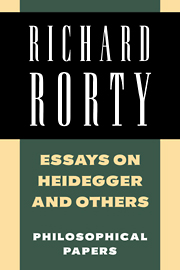Book contents
De Man and the American Cultural Left
Published online by Cambridge University Press: 14 January 2010
Summary
Paul de Man was one of the most beloved and influential teachers of recent times. He was the person primarily responsible for the movement which we now call “deconstruction.” The special twist which de Man put on certain Heideggerian and Derridean themes has been the single most influential contribution to what is sometimes called, by its enemies, “the politicization of the humanities” in American universities. De Man's interpretations of these men's work laid the foundation for the attempt, widespread among American academics in recent years, to reinvigorate leftist social criticism by deploying new philosophico-literary weapons. This attempt is central to the activities of what Henry Gates has called “the American Cultural Left,” defined by him as “a Rainbow Coalition” of deconstructionists, feminists, people working in gay and ethnic studies, and so on.
Members of the Cultural Left typically believe that we have recently acquired a radically new understanding of the nature of language and of literature. They think that this shift is comparable in importance to the shift from Aristotelian to Galilean mechanics, and that it has similarly important moral and political consequences. For the Cultural Left, “reading” – in the special sense which de Man gave to that term – has become a watchword in the same way that “scientific method” was a watchword in the 1920s and 1930s. In that period, everyone from H.G. Wells to John Dewey was telling us that life and politics would become better if only we could adopt the attitude and the habits of the natural scientist. We are now being told the same sort of thing about the attitude and habits of the literary critic.
- Type
- Chapter
- Information
- Essays on Heidegger and OthersPhilosophical Papers, pp. 129 - 140Publisher: Cambridge University PressPrint publication year: 1991
- 4
- Cited by

